面试英语翻译:面试时五类问题不可问
英语面试时雇主不得涉及的问题
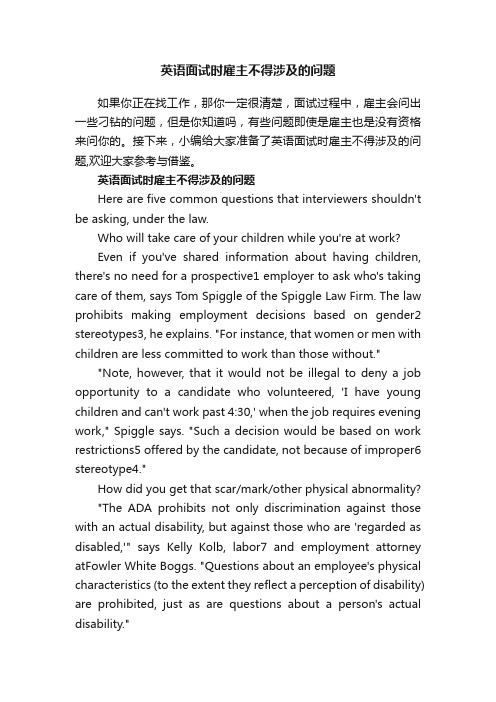
英语面试时雇主不得涉及的问题如果你正在找工作,那你一定很清楚,面试过程中,雇主会问出一些刁钻的问题,但是你知道吗,有些问题即使是雇主也是没有资格来问你的。
接下来,小编给大家准备了英语面试时雇主不得涉及的问题,欢迎大家参考与借鉴。
英语面试时雇主不得涉及的问题Here are five common questions that interviewers shouldn't be asking, under the law.Who will take care of your children while you're at work?Even if you've shared information about having children, there's no need for a prospective1 employer to ask who's taking care of them, says Tom Spiggle of the Spiggle Law Firm. The law prohibits making employment decisions based on gender2 stereotypes3, he explains. "For instance, that women or men with children are less committed to work than those without.""Note, however, that it would not be illegal to deny a job opportunity to a candidate who volunteered, 'I have young children and can't work past 4:30,' when the job requires evening work," Spiggle says. "Such a decision would be based on work restrictions5 offered by the candidate, not because of improper6 stereotype4."How did you get that scar/mark/other physical abnormality?"The ADA prohibits not only discrimination against those with an actual disability, but against those who are 'regarded as disabled,'" says Kelly Kolb, labor7 and employment attorney atFowler White Boggs. "Questions about an employee's physical characteristics (to the extent they reflect a perception of disability) are prohibited, just as are questions about a person's actual disability."Prospective employers may, however, ask if you're able to perform essential functions of the job, with or without accommodation, Kolb says.How often are you deployed8 for your Army Reserve training exercises?Kolb says employers cannot make employment decisions on the basis of a service member's membership or active duty service in the military. "Essentially9, the employer cannot ask questions about the effect of the employee's military service on his ability to work for the employer."When are you planning on having children?Employers can't make judgments10 about a person's dedication11 to their work by whether they have kids or will have them in the future. "If the employer wants to find out how committed the candidate will be to the job offered, the interviewer should ask questions such as, 'What hours can you work?' or 'Do you have commitments aside from work that will interfere12 with specific job requirements such as traveling?'" says Davida S. Perry of Schwartz & Perry.Even an innocuous(无伤大雅的) question such as "when is your baby due?" to an obviously pregnant applicant13 can cause problems, says Lisa Schmid, an attorney at Nilan Johnson Lewis. "It is not illegal under the Pregnancy14 Discrimination Act, but it presents a risk for employers because it obviously seeks information about an applicant's pregnancy, and discrimination on the basis of pregnancy is illegal." Also, there may be state laws that explicitly15 prohibit asking about a pregnancy.Have you ever been arrested?It's legal to ask about whether candidates have been convicted of a crime, but not if they've been arrested, says ShariShore of Wolf and Shore Law. Cases may have been dismissed without a conviction, or the original charges may have been lowered to lesser16 charges.扩展:职场词汇公司职务等级:招聘经理 recruiting manager高级秘书 senior secretary销售总监 sales director总裁 president小资small potatoes中产阶级 middle class高产阶级 upper class富人 upper crust公司职位一览:秘书 secretary行政秘书 executive secretary地区销售总监秘书 secretary to regional sales director人事行政专员 HR executive助理人事行政经理assistant HR(Human Resource) & administrative manager人事主管 HR supervisor人事经理 HR manager职场相关用语:简报 catalog公司奖励旅行 company bonus trip电话会议 teleconference标书 bidding plan公司内部职位竞聘 internal position to be filled by competitive selection辞职信 letter of resignation年会 annual meeting。
面试时哪些问题不该问
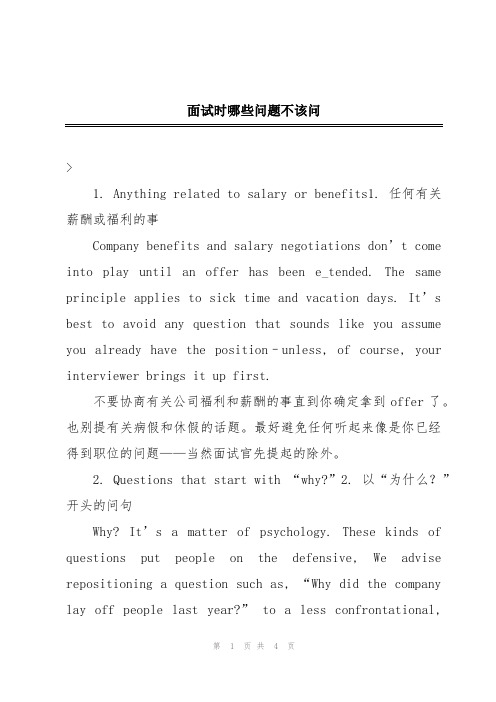
面试时哪些问题不该问>1. Anything related to salary or benefits1. 任何有关薪酬或福利的事Company benefits and salary negotiations don’t come into play until an offer has been e_tended. The same principle applies to sick time and vacation days. It’s best to avoid any question that sounds like you assume you already have the position–unless, of course, your interviewer brings it up first.不要协商有关公司福利和薪酬的事直到你确定拿到offer了。
也别提有关病假和休假的话题。
最好避免任何听起来像是你已经得到职位的问题——当然面试官先提起的除外。
2. Questions that start with “why?”2. 以“为什么?”开头的问句Why? It’s a matter of psychology. These kinds of questions put people on the defensive, We advise repositioning a question such as, “Why did the company lay off people last year?” to a less confrontational,“I read about the layoffs you had. What’s your opinion on how the company is positioned for the future?”为什么这样说呢?这涉及到心理学了。
英语面试问题回答技巧

1. "What can you tell me about yourself?" This is not an invitation to give your life history. The interviewer is looking for clues about your character, qualifications, ambitions, and motivations.The following is a good example of a positive response. "In high school I was involved in competitive sports and I always tried to improve in each sport I participated in. As a college student, I worked in a clothing store part-time and found that I could sell things easily. The sale was important, but for me, it was even more important to make sure that the customer was satisfied. It was not long before customers came back to the store and specifically asked for me to help them. I’m very competitive and it means a lot to me to be the best.""关于你自己,你能告诉我些什么?"这一问题并非在请你大谈你的个人历史。
雇主是在寻找有关你性格、资历、志向和生活动力的线索。
面试中不能问的五个问题
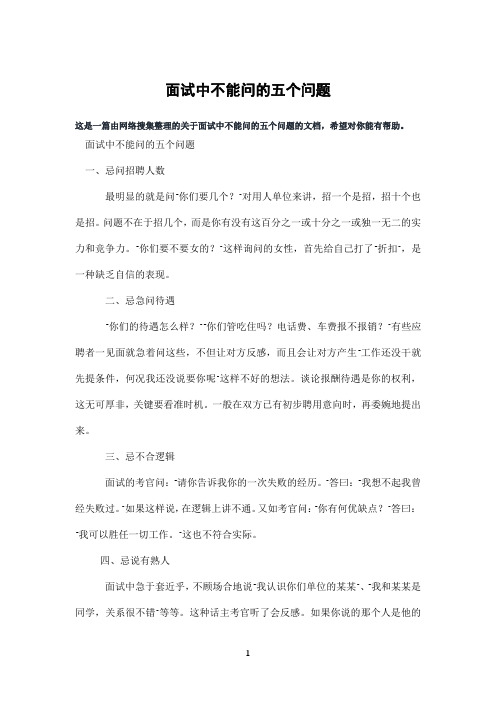
面试中不能问的五个问题这是一篇由网络搜集整理的关于面试中不能问的五个问题的文档,希望对你能有帮助。
面试中不能问的五个问题一、忌问招聘人数最明显的就是问“你们要几个?”对用人单位来讲,招一个是招,招十个也是招。
问题不在于招几个,而是你有没有这百分之一或十分之一或独一无二的实力和竞争力。
“你们要不要女的?”这样询问的女性,首先给自己打了“折扣”,是一种缺乏自信的表现。
二、忌急问待遇“你们的待遇怎么样?”“你们管吃住吗?电话费、车费报不报销?”有些应聘者一见面就急着问这些,不但让对方反感,而且会让对方产生“工作还没干就先提条件,何况我还没说要你呢”这样不好的想法。
谈论报酬待遇是你的权利,这无可厚非,关键要看准时机。
一般在双方已有初步聘用意向时,再委婉地提出来。
三、忌不合逻辑面试的考官问:“请你告诉我你的一次失败的经历。
”答曰:“我想不起我曾经失败过。
”如果这样说,在逻辑上讲不通。
又如考官问:“你有何优缺点?”答曰:“我可以胜任一切工作。
”这也不符合实际。
四、忌说有熟人面试中急于套近乎,不顾场合地说“我认识你们单位的某某”、“我和某某是同学,关系很不错”等等。
这种话主考官听了会反感。
如果你说的那个人是他的顶头上司,主考官会觉得你在以势压人;如果主考官与你所说的那个人关系不怎么好,甚至有矛盾,那么你这样引出的结果很可能就是自我遭殃。
五、忌超出范围例如面试快要结束时,主考官问求职者:“请问你有什么问题要问我吗?”这位求职者欠了欠身子问道:“请问你们企业的规模有多大?你们未来5年的发展规划如何?”诸如此类的问题。
这是求职者没有把自己的'位置摆正,提出的问题已经超出了求职者应当提问的范围,使主考官产生了厌烦。
主考官甚至会想:哪有这么多的问题?你是来求职的呢?还是来调查情况的呢?六、忌不当反问例如主考官问:“关于工资,你的期望值是多少?”应聘者反问:“你们打算出多少?”这样的反问就很不礼貌,好像是在谈判,很容易引起主考官的不快和敌视。
面试官用英语提问最有可能会问的问题(经典)

Why shouldwe hire you? 为什么我们要 选择你?
What did you like least about your last job? 关于上一份工作,你最不喜欢什 么?
What kind of goals would you have in mind if you got this job? 如果你得到这份工作,你有什么样的 目标?
What's the most difficult decision you've made in the last two years and how did you come to tha t decision? 在过去两年间,最让你难以抉择的事情是什么?你是如何做出 决定的?
Describe how you would handlea situation if you were required to finish multiple tasks by the en d of the day, and there was no conceivable way that you could finishthem. 假设你在一天之中有很多项任务需要完成,但是全部完成这些任务是不 可能的,你会怎么
Give me an example of a time you did something wrong. How did you handleit? 举例描述你做错事情的经历,你是如何处理 的?
Tell me about a time where you had to deal with conflict on the job. 告诉我你是怎样处理工作上 的纠纷?
实用英语口语——求职时切不可问的8个问题
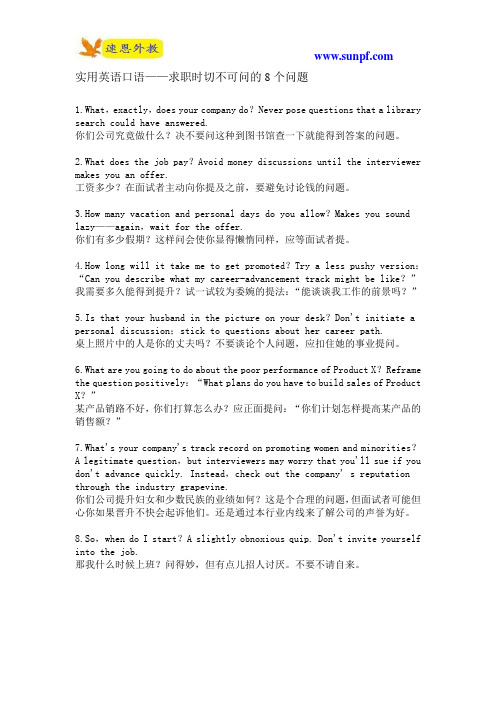
实用英语口语——求职时切不可问的8个问题1.What,exactly,does your company do?Never pose questions that a library search could have answered.你们公司究竟做什么?决不要问这种到图书馆查一下就能得到答案的问题。
2.What does the job pay?Avoid money discussions until the interviewer makes you an offer.工资多少?在面试者主动向你提及之前,要避免讨论钱的问题。
3.How many vacation and personal days do you allow?Makes you sound lazy——again,wait for the offer.你们有多少假期?这样问会使你显得懒惰同样,应等面试者提。
4.How long will it take me to get promoted?Try a less pushy version:“Can you describe what my career-advancement track might be like?”我需要多久能得到提升?试一试较为委婉的提法:“能谈谈我工作的前景吗?”5.Is that your husband in the picture on your desk?Don't initiate a personal discussion;stick to questions about her career path.桌上照片中的人是你的丈夫吗?不要谈论个人问题,应扣住她的事业提问。
6.What are you going to do about the poor performance of Product X?Reframe the question positively:“What plans do you have to build sales of Product X?”某产品销路不好,你们打算怎么办?应正面提问:“你们计划怎样提高某产品的销售额?”7.What's your company's track record on promoting women and minorities?A legitimate question,but interviewers may worry that you'll sue if you don't advance quickly. Instead,check out the company' s reputation through the industry grapevine.你们公司提升妇女和少数民族的业绩如何?这是个合理的问题,但面试者可能但心你如果晋升不快会起诉他们。
英语面试常见问题附答案(通用4篇)

英语面试常见问题附答案(通用4篇)常见英文面试问题(附答案篇一1、你对学生会是怎么看的?对于学生会你有什么想法?2、你为什么要加入XX部门?(判断沟通能力和口才)你对XX部了解有多少?回答这个问题时,一定要积极正面,如想要使自己能有更好的发展空间,希望能在相关领域中有所发展,希望能在XX部门多多学习等等﹔此时可以稍稍夸一下XX部,但切记一定要诚恳,不然可是会画蛇添足,得不偿失哦!所以建议你可以坦承的说出自己的动机,不过用语还是要思考一下。
3、你高中阶段有没有担任什么职务,这些工作对你影响?你在做学生工作中碰到的令你棘手的问题是什么?a.很多学生在面试的时候都说自己是班干,这是一个很好的验证问题b.看是不是撒谎,有没有实在有用的认识,测定其工作能力这个主要看应聘者有没有经验,如果有当然好,没有就回答没有,要不会问你担任的感受,对你的影响等等。
如果被看出是撒谎,对你的印象肯定不好!4、谈谈你加入XX部门的优势?这个问题主要看你是否有培养和发展的潜力,更看重你是否稳重,有头脑,自信,能独立开展和组织活动的能力!回答这个问题一定要说自己自己在这些方面的特长,切不可以想到说什么,没有重点。
5、如果你进了学生会,怎么处理好学习和工作,干部和学生的关系?大学里的学习是多方面的,学生会就是一个值得我去学习的优秀集体,相信在学生会里我能更快的提高,也能更好的学习。
这个问题很尖锐,可以不正面回答。
是我的部长把我带入这个优秀的集体,首先我会很尊敬他,我相信学生会的干部都有我值得学习的地方,我会很虚心的向他们学习,并尽我的努力去完成学生会的工作。
他们不但是我的上级,还是我的良师益友,我把他们当作我的学长和朋友!6、谈谈你曾经组织或参加活动的经验和教训!有经验谈经验,如果没有可以谈谈你见到一些失败对你的启发,切不可说没有,没有经历的人,很让人怀疑他的能力和观察力。
7、你认为你的缺点是什么?(自信,自省陷阱。
面试多谈优点,少提缺点8、如果面试者提及自己做过班干,问:你和其他班委因为工作有过分歧吗?最后的结果是?(团队协作,协调,组织,领导)9、是否有过失败的经历?从中你是否有收获?其实最失败的经历,我们面试官应该看重的是他经历了什么失败的事情,她是如何处理这件事情,什么方式处理上的不当所造成的重点是看过程而不是失败的结果我们应该考察的是看面试者如何在经历了失败的事情后,如何去总结反思和处理善后。
面试中不能问的20个面试问题

面试中不能问的20个面试问题这是一篇由网络搜集整理的关于面试中不能问的20个面试问题的文档,希望对你能有帮助。
1.你的公司做什么的?what-does-your-company-do这样的问题会让你看起来毫无准备。
避免去问这样的问题,因为用谷歌搜索一下,就可以很容易地获得答案。
2.我的薪水将会是怎样的?谈钱的事情可以暂缓一下。
Execu|搜索集团人力资源公司高级董事总经理杰西·西耶戈尔表示:“候选人必须提前仔细的收集有关公司的信息,以及假设自己会得到这个职位,应该怎样处理工作。
”直接谈钱显得你很傲慢和粗鲁。
3.我需要加班吗?这就是说:“我很懒。
”4.我什么时候可以去度假?how-soon-can-i-take-a-vacation在你得到这份工作之前就想着度假的事情,这显得你对这份工作并不上心。
5.请问我可以报销那些账单?在面试时候问这个,是一个很糟糕的错误,很可能会向面试官传递错误的信息。
6.如何才能够迅速晋升?专注于手头的工作,而不是一直夸夸奇谈。
7.如果我与我的老板或同事相处不太好,公司会怎么做?what-happens-if-i-dont-get-along-with-my-boss-or-coworkers如果你在过去的工作中,与同事交往有问题,他们甚至可能会认为你很难相处。
8.有什么样的好处?你最好将这个问题保留在你获得工作机会以后,再去提问。
西耶戈尔说:“通常情况下,企业为了吸引应聘者,会在其网站上的公布待遇好处的信息,因此你很可能会找到这些信息,在面试时候就不要提问了。
”9.我怎样才有资格获得加薪?这可能会告诉面试官,钱是你所关心的唯一的事情。
10.只要让我的工作做完,我可以提前到达或者提前离开?can-i-arrive-early-or-leave-late-as-long-as-i-get-my-work-done在你没有获得工作机会之前,不要试图调整时间。
11.你结婚了吗?你有孩子吗?等等问题。
常见英文面试问题(附答案)

常见英文面试问题(附答案)常见英文面试问题大全(附答案)在学习和工作的日常里,我们很多时候都不得不用到试题,试题是用于考试的题目,要求按照标准回答。
你所见过的试题是什么样的呢?以下是小编为大家整理的109个常见英文面试问题(附答案),供大家参考借鉴,希望可以帮助到有需要的朋友。
常见英文面试问题(附答案) 篇11、你认为自己的哪项技能需要加强?麻烦又来了,你不可能宣称自己无所不能,但如果你简单地承认自己在哪方面需要改进,高压面试主考就会像嗜血的鲨鱼一样一口咬住你。
你该重新定义一下这个问题以便躲开这一点:“既然谈到这儿,我想说我已具备了这份工作所需的所有技能。
这也是我所以对这个职位感兴趣的原因。
”你可以借机再把自己简历中的闪光之处再炫耀一番。
2、告诉我,你最大的弱点是什么?回答这种问题的秘诀在于不接受这种否定暗示。
不要否认你有缺点,没人会相信世界上有完人;相反,你应该承认一个微不足道的弱点或一个小小的缺点,然后再说那都已经成为过去了,表明自己是怎样克服这个缺点的。
3、你认为什么样的决定最为难做?如果你用他问题中的这些词来回答,就只能对自己不利了。
主考会立刻猛扑上来。
那回答的秘诀是什么呢?要摒弃那些否定性的词汇:“我没发现有什么决定特别‘难’做,但确实有时做一些决定要比做其他的决定要多费一些脑筋,多做些分析。
也许你把这叫做‘难’,但我认为我拿工资就是做这些事情的。
”4、你与现在的老板相处很久了,为什么不继续干下去了呢?假设说主考已经击中了你的要害,他说得完全是事实,但这并不意味着你就非得同意他问题中对你不利的因素。
“我喜欢现在这份工作是因为它既稳定又有挑战性。
而在那里我已经不可能有更大的发展了,因此我到此来应聘。
我希望换一家公司以便更好地发挥自己的才能。
”5、现在这份工作你最不喜欢的是哪一点?又是典型的用否定词表述的高压问题。
但即使这样,也要避免其中的否定因素。
考官可不管是不是他促使你如此挑剔的,他只能记住你是一个爱抱怨的人。
英语面试可能会被问及的问题

1.Why do you choose our school ?(为什么选择本校?)I am a graduate of this school,I have deep feelings about our school,.I have been deeply impressed by the academic atmosphere here when I came here.And there are teachers and surroundings I know well.2.If you fail this time ......?(加入你这次失败了...?)If I fail in this time ,it’s means there is much room that I need to improve myself .I’ll never give up my pursuit of dream.3.Your hobbies?(你的兴趣是什么?)I have much hobbies ,such as reading, traveling and make handwork.4.Introduce your family.......?(介绍你的家庭...?)My Mom and dad are retired,We have a cute little puppy,a part of our family,My father used to be an agricultural technician. After he retired, he still reads every day. Now he is rehired in the company.My mother is a housewife, is a solid support for everyone in the family.5.(对提问不清楚,要求重复)I’m sorry ,I don’t know much about ........6.(对提问不懂)I am sorry,can i anwser the question in chinese.I beg your pardon. I don't understand your question.I am sorry, I really didn't prepare for this question......。
2021年英语面试不应过问的问题
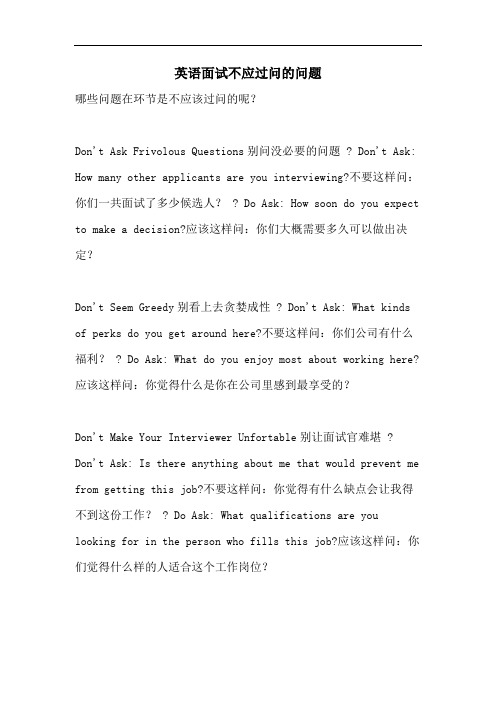
英语面试不应过问的问题哪些问题在环节是不应该过问的呢?Don't Ask Frivolous Questions别问没必要的问题 ? Don't Ask: How many other applicants are you interviewing?不要这样问:你们一共面试了多少候选人? ? Do Ask: How soon do you expect to make a decision?应该这样问:你们大概需要多久可以做出决定?Don't Seem Greedy别看上去贪婪成性 ? Don't Ask: What kinds of perks do you get around here?不要这样问:你们公司有什么福利? ? Do Ask: What do you enjoy most about working here?应该这样问:你觉得什么是你在公司里感到最享受的?Don't Make Your Interviewer Unfortable别让面试官难堪 ?Don't Ask: Is there anything about me that would prevent me from getting this job?不要这样问:你觉得有什么缺点会让我得不到这份工作? ? Do Ask: What qualifications are you looking for in the person who fills this job?应该这样问:你们觉得什么样的人适合这个工作岗位?Don't Get Bogged Down in Details别问得太细 ? Don't Ask: Can you break down my day in terms of hours spent doing A, B, C, D, etc.?不要这样问:你能不能把我每天要做的事按照一二三四地给我详细说说? ? Do Ask: Can you ___ me what my average day would be like?应该这样问:你能否给我介绍一下我的日常工作安排?Don't Be a Gossip别太八卦 ? Don't Ask: I heard the CEO was involved in scandalous activity; is that true?不要这样问:我听说你们的CEO现在 ___缠身,是不是真的啊? ? Do Ask: While researching your firm I learned that the pany recently [fill in the blank]. Can you ___ me a little bit more about this development?应该这样问:在我对贵公司进行调查了解的时候,我发现贵公司正身陷……,你能不能多给我一点关于这件事情的消息呢?模板,内容仅供参考。
面试时绝对不能说的10句话
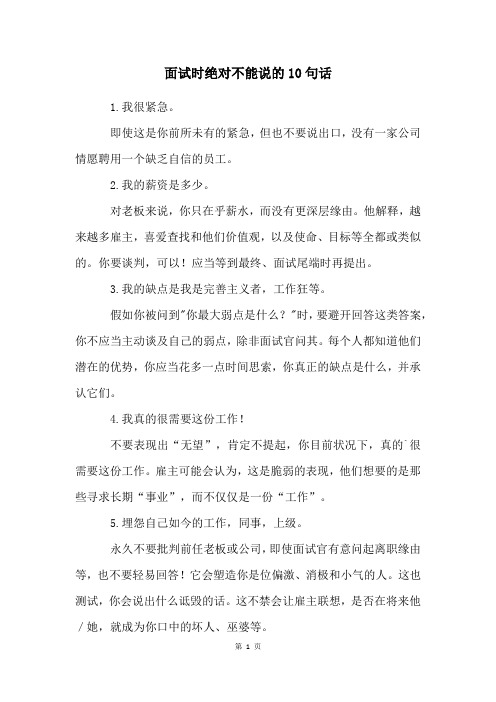
面试时绝对不能说的10句话1.我很紧急。
即使这是你前所未有的紧急,但也不要说出口,没有一家公司情愿聘用一个缺乏自信的员工。
2.我的薪资是多少。
对老板来说,你只在乎薪水,而没有更深层缘由。
他解释,越来越多雇主,喜爱查找和他们价值观,以及使命、目标等全都或类似的。
你要谈判,可以!应当等到最终、面试尾端时再提出。
3.我的缺点是我是完善主义者,工作狂等。
假如你被问到"你最大弱点是什么?"时,要避开回答这类答案,你不应当主动谈及自己的弱点,除非面试官问其。
每个人都知道他们潜在的优势,你应当花多一点时间思索,你真正的缺点是什么,并承认它们。
4.我真的很需要这份工作!不要表现出“无望”,肯定不提起,你目前状况下,真的`很需要这份工作。
雇主可能会认为,这是脆弱的表现,他们想要的是那些寻求长期“事业”,而不仅仅是一份“工作”。
5.埋怨自己如今的工作,同事,上级。
永久不要批判前任老板或公司,即使面试官有意问起离职缘由等,也不要轻易回答!它会塑造你是位偏激、消极和小气的人。
这也测试,你会说出什么诋毁的话。
这不禁会让雇主联想,是否在将来他/她,就成为你口中的坏人、巫婆等。
6.我需要……不要在谈话中始终提到“我需要……”,这是雇主在谈他们的需求,而你是否能帮到他们。
7.请问我们什么时候结束?你不应当留下赶时间、兼差的印象,当30分钟的面试延长至90分钟,一切进行很顺当,但你却频频看手表或时钟,一旦还有别的重要事情,那么面试官最终确定不会录用你。
8.我喜爱贵公司供应的福利津贴。
不要带着你有多爱公司的福利津贴,如每个星期三、五会供应免费零食。
同样地,这会造成你更在乎这些好处,而不是工作上的奉献。
9.无可奉告!除非面试官问你一个涉及个人隐私、非法或让你感到特别不舒适的问题,否则你应当回应他们的疑问。
面试,不会始终是“无可奉告”,这会让你看起来是有所隐瞒或毫无预备。
10.我没有问题要问。
当他们询问你是否有问题有问时,千万别说"不",这会显得你对面试毫无预备,或者更糟。
面试中不可不问的7个犀利问题
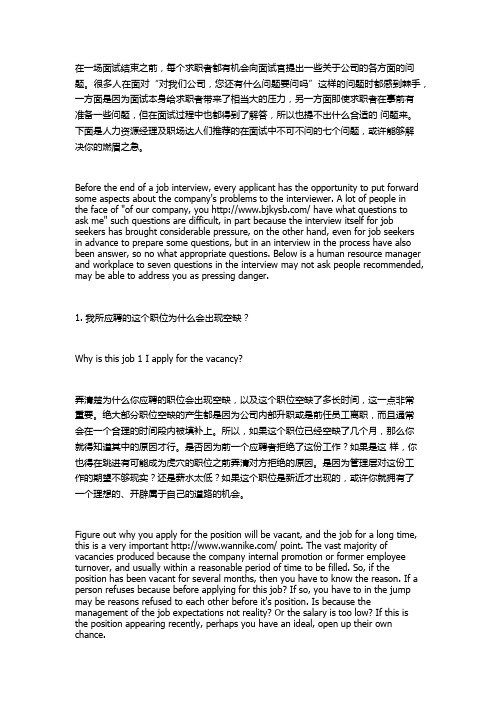
在一场面试结束之前,每个求职者都有机会向面试官提出一些关于公司的各方面的问题。
很多人在面对“对我们公司,您还有什么问题要问吗”这样的问题时都感到棘手,一方面是因为面试本身给求职者带来了相当大的压力,另一方面即使求职者在事前有准备一些问题,但在面试过程中也都得到了解答,所以也提不出什么合适的问题来。
下面是人力资源经理及职场达人们推荐的在面试中不可不问的七个问题,或许能够解决你的燃眉之急。
Before the end of a job interview, every applicant has the opportunity to put forward some aspects about the company's problems to the interviewer. A lot of people inthe face of "of our company, you / have what questions to ask me" such questions are difficult, in part because the interview itself for job seekers has brought considerable pressure, on the other hand, even for job seekersin advance to prepare some questions, but in an interview in the process have also been answer, so no what appropriate questions. Below is a human resource manager and workplace to seven questions in the interview may not ask people recommended, may be able to address you as pressing danger.1. 我所应聘的这个职位为什么会出现空缺?Why is this job 1 I apply for the vacancy?弄清楚为什么你应聘的职位会出现空缺,以及这个职位空缺了多长时间,这一点非常重要。
- 1、下载文档前请自行甄别文档内容的完整性,平台不提供额外的编辑、内容补充、找答案等附加服务。
- 2、"仅部分预览"的文档,不可在线预览部分如存在完整性等问题,可反馈申请退款(可完整预览的文档不适用该条件!)。
- 3、如文档侵犯您的权益,请联系客服反馈,我们会尽快为您处理(人工客服工作时间:9:00-18:30)。
面试英语翻译:面试时五类问题不可问If you’re looking for a new job, you know you’re going to have to answer some tough questions in the interview process. But did you know there are some questions that are illegal for employers to ask you?For example, it’s illegal to ask any questions relatedto protected classes, says Charles A. Krugel, an HR attorney. “Protected classes typically include race, gender, nationality, religion, military status and age (40 and up). Usually, such questions are intended to identify those class members. More often than not, it's ‘loaded’ questions that are asked, or those where it's fairly obvious that the asker has a hidden agenda and the question has little to do withthe job's essential duties.”Some exampl es of these questions include,”I notice that you live in Brookfield, there's some nice country clubs and retirement communities there -- are you a member of any of them?” and “If you need to commute to work, how would you do that?” The first question can r elate to socioeconomic status, gender, race, religion and age, Krugel says., while the second may be looking for information on socioeconomic status and race.Here are five common questions that interviewers shouldn’t be asking, under the law.Who will take care of your children while you’re at work?Even if you’ve shared information about having children, there’s no need for a prospective employer to ask who’staking care of them, says Tom Spiggle of the Spiggle Law Firm. The law prohibits making employment decisions based on gender stereotypes, he explains. “For instance, that women or men with children are less committed to work than those without.”“Note, however, that it would not be illegal to deny ajob opportunity to a candidate who volunteer ed, ‘I haveyoung children and can't work past 4:30,’ when the job requires evening work,” Spiggle says. “Such a decisionwould be based on work restrictions offered by the candidate, not because of improper stereotype.”How did you get that scar/mark/other physical abnormality?“The ADA prohibits not only discrimination against those with an actual disability, but against those who are‘regarded as disabled,’” says Kelly Kolb, labor and employment attorney atFowler White Boggs. “Questions aboutan employee's physical characteristics (to the extent they reflect a perception of disability) are prohibited, just asare questions about a person's actual disability.”Prospective employers may, however, ask if you’re ableto perform essential functions of the job, with or without accommodation, Kolb says.How often are you deployed for your Army Reserve training exercises?Kolb says employers cannot make employment decisions onthe basis of a service member's membership or active duty service in the milit ary. “Essentially, the employer cannot ask questions about the effect of the employee's military service on his ability to work for the employer.”When are you planning on having children?Employers can’t make judgments about a person’s dedication to their work by whether they have kids or will have them in the future. “If the employer wants to find out how committed the candidate will be to the job offered, the interviewer should ask questions such as, ‘What hours can you work?’ or ‘Do you have commitm ents aside from work that will interfere with specific job requirements such as traveling?’” says Davida S. Perry of Schwartz & Perry.Even an innocuous question such as “when is your baby due?” to an obviously pregnant applicant can cause problems, says Lisa Schmid, an attorney at Nilan Johnson Lewis. “It is not illegal under the Pregnancy Discrimination Act, but it presents a risk for employers because it obviously seeks information about an applicant’s pregnancy, and discrimination on the basis of preg nancy is illegal.” Also, there may be state laws that explicitly prohibit asking about a pregnancy.Have you ever been arrested?It’s legal to ask about whether candidates have been convicted of a crime, but not if they’ve been arrested, says Shari Shore of Wolf and Shore Law. Cases may have been dismissed without a conviction, or the original charges may have been lowered to lesser charges.如果你正在找工作,那你一定很清楚,面试过程中,雇主会问出一些刁钻的问题,但是你知道吗,有些问题即使是雇主也是没有资格来问你的。
人力资源律师查尔斯·A·库鲁格表示,像应聘者的一些个人信息是受到保护的,雇主不得开口询问。
“具体有以下几点:关于种族,性别,国籍,宗教,军衔和年龄(如应聘者年龄达四十及以上)的信息。
通常来说,雇主提这些问题的目的是想给应聘者贴上标签。
而雇主通过提问刺探应聘者隐私往往会给后者带来很大压力,很明显,他们是有意为之,而这些问题又基本和未来的工作无关。
